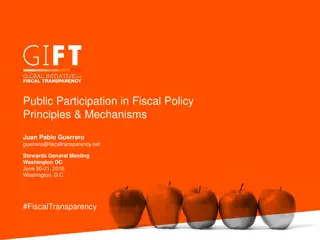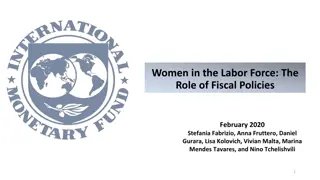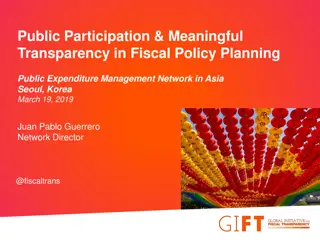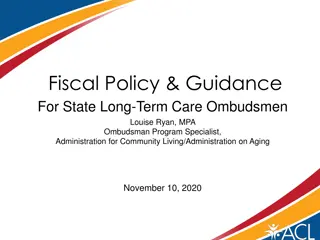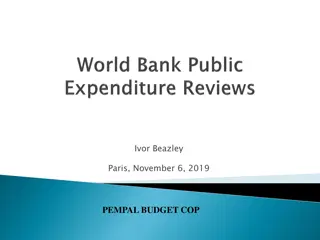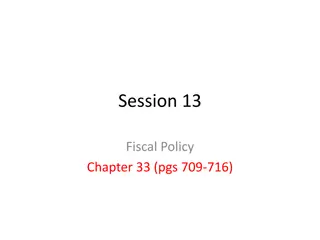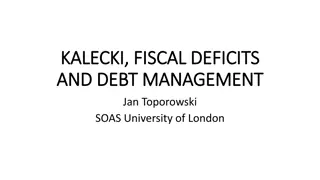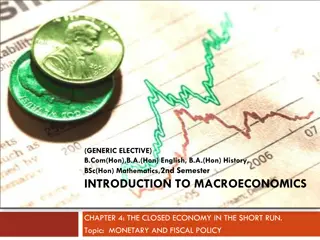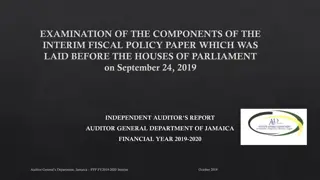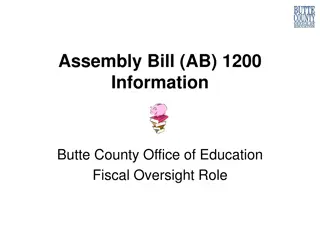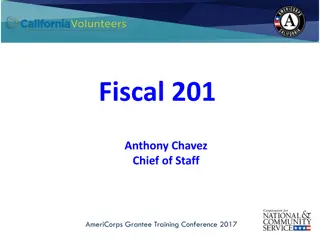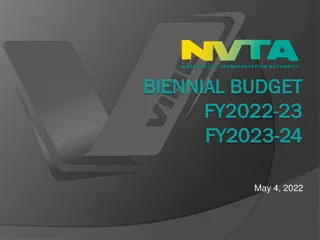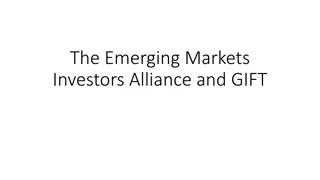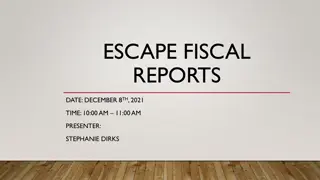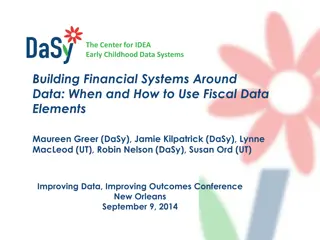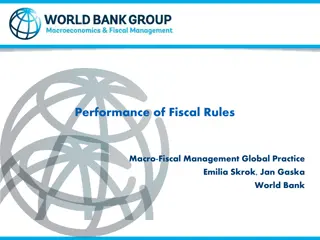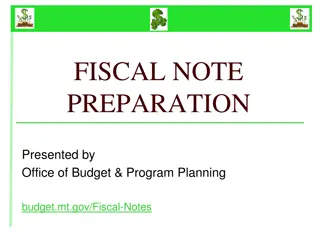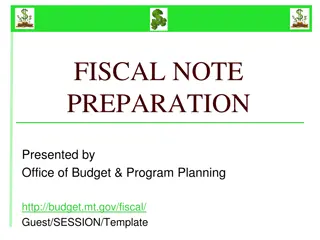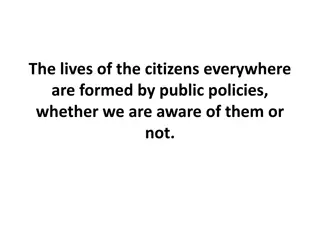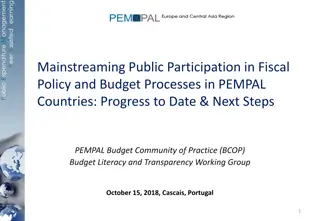Enhancing Public Participation in Fiscal Policy: Guidelines and Case Studies
Explore the importance of public participation in fiscal policy, with a focus on Africa, through guidelines and case studies. Learn about the GIFT principles, examples of participation in budget processes, and the impact of citizen engagement on resource allocation, service provision, and community well-being.
Download Presentation

Please find below an Image/Link to download the presentation.
The content on the website is provided AS IS for your information and personal use only. It may not be sold, licensed, or shared on other websites without obtaining consent from the author.If you encounter any issues during the download, it is possible that the publisher has removed the file from their server.
You are allowed to download the files provided on this website for personal or commercial use, subject to the condition that they are used lawfully. All files are the property of their respective owners.
The content on the website is provided AS IS for your information and personal use only. It may not be sold, licensed, or shared on other websites without obtaining consent from the author.
E N D
Presentation Transcript
Towards greater Transparency, Participation and Accountability in Africa Guidelines and Case Studies on Public Participation in Fiscal Policy Juan Pablo Guerrero CONAKRY, GUINEA February 23-24, 2018 #FiscalTransparency
Contents 1. Why Public Participation in Fiscal Policy? 2. GIFT Principles of Public Participation 3. Public Participation in OBS 2017, lessons learned 4. Examples of Public Participation in the Budget Process in Africa 5. Group Discussion 2
Why public participation in the budget cycle? 2008: Global Financial Crisis, PFM Governance, disclosure of information alone is not sufficient for accountability Participation is key for Sustainable Development Goals: 1-poverty, 5-gender equality, 10-reduce inequality, 16-peace, justice & inclusive institutions Public Participation as a the core of Open Government Partnership Government data at reach: big data, open data & information technologies 3
Access to information and public participation: What difference does it make? o Better resource allocation & provision of public services o Improved response to the preferences of beneficiaries of services & constituencies o Opportunity for marginalized groups to exert some influence in decisions that affect them o Greater impact of actions that affect communities in social policies: health sector, community level public works, education, in a word, well-being o Increases trust and citizen compliance (rules & taxes)
But, how exactly should governments engage citizens in public spending? A starting point for GIFT was to address the gaps in norms, as well as the lack of guidance on how governments should engage the public 5
Accessibility - accsibilit Disseminate complete fiscal information and all other relevant data, easy for all to access, understand, and to use, re-use and transform, namely in open data formats. Openness - Clairet Provide full information on and be responsive with respect to the purpose, scope, constraints, intended outcomes, process and timelines, as well as the expected and actual results of public participation. Inclusiveness - inclusion Proactively engage citizens and non-state actors, including excluded & vulnerable groups & individuals, & voices that are seldom heard, without discrimination & consider public inputs on an objective basis irrespective of their source.
Respect for self-expression Allow articulate their interests in their own ways, and to choose means of engagement that they prefer. There may be groups that have standing to speak on behalf of others. Timeliness - oportunit Sufficient time in the budget and policy cycles for inputs in each phase; while a range of options is still open; and, where desirable, allow for more than one round of engagement. Depth profondeur/pertinence Provide information about key policy objectives, options, choices and trade-offs, potential impacts, and incorporate a diversity of perspectives; provide feedback on public inputs and how they have been incorporated. Proportionality Use a mix of engagement mechanisms proportionate to the scale and impact of the issue or policy concerned.
Sustainability - durabilit On-going and regular engagement to increase knowledge sharing and mutual trust over time; institutionalize public participation; feedback provided leads to revision of the fiscal policy decisions; and regularly review and evaluate experience to improve future engagement. Complementarity Ensure mechanisms for public participation and citizen engagement complement and increase the effectiveness of existing governance and accountability systems. Reciprocity All state and non-state entities should be open about their mission, the interests they seek to advance, and who they represent; respect all agreed; cooperate to achieve objectives.
BETTER ALLOCATION + PROVISION Bottom Up Budgeting in the Philippines BASIC FACTS Executive Branch Lead Formulation& Implementation budget stage Local & National level Principles of Complementarity, Depth, Inclusiveness, Openness, Reciprocity, Sustainability &Timeliness Primary objective (2012): deliver basic social services to the poor, reduce the influence of local elites and empower the citizenry Local poverty reduction action team (LPRAT) determines local priority projects (based on national guidelines) A general assembly is established: 50% members are from government and 50% from CSOs The assembly recommends projects to the LPRAT Suggested projects are submitted for incorporation in the budget of the participating national agencies CSOs can engage in the monitoring of the BuB projects In 2016: BuB included 1,514 cities and municipalities and a budget 3 times bigger than in 2012 10
MARGINALIZED HAVE INFLUENCE FOR THEIR BENEFIT Education Reform Program in Mexico BASIC FACTS Executive Branch Lead Enactment & Formulation budget stage National level Principles of Accessibility, Complementarity, Depth, Inclusiveness, Openness, Reciprocity, Respect for self- expression, Sustainability, Timeliness Aiming to improve the infrastructure and equipment of the most vulnerable basic schools Parents, teachers and directors form a committee and decide how to prioritize federal funds that have been allocated for their schools Public engagement takes place at all stages of the process, from allocation of resources, to implementation and monitoring Interactive website allows users to monitor project status The program has benefited over 20 thousand schools and has been renewed for 2016 11
BETTER DEVELOPMENT OUTCOMES Public Policy Councils in Brazil BASIC FACTS Executive Branch Lead Formulation budget stage Local/ Regional/National level Principles of Complementarity, Depth, Proportionality, Reciprocity, Respect for self- expression, Sustainability &Timeliness Permanent collegiate bodies creating, implementing, and monitoring public policies Operate at all three levels of government (federal, state, municipal), in various thematic areas Membership is based on parity (government and CSOs) Councils must approve the budget in their policy area In 2012 municipals councils in health, social care, and rights of children fully operational in 99% of municipalities 75% of national council members consider they have a significant impact on policy Number of councils grown exponentially over the past 20 years 12
GIFT Principles of Public Participation in OBS-2017 Principles of Public Participation in Fiscal Policy OBS 2017 Questions 126, 129: Executives take concrete steps to include vulnerable or underrepresented groups 125, 128, 135: Mechanisms at budget formulation and approval stages show evidence of inclusiveness Inclusiveness 125: Mechanisms at formulation ensure early participation, before major decisions made Timeliness 127, 130, 137: Ensuring a wide scope of discussion on all key budget issues, not just a few 131: Purposes and scope of participation are clearly provided in advance Openness / Depth 132, 133, 138, 141: Executives, legislatures, and supreme audit institutions provide feedback on inputs received from the public, encouraging further engagement Sustainability
Main changes from the OBS 2015 to the 2017 2015 and 2017 OBS not comparable Only participation related directly to the NATIONAL budget is measured Higher standards: 1. Highest scores for engagement between government (MoF) & citizens collection of citizen input 2. Reach a wide public (special attention to vulnerable groups) selecting groups or individuals for feedback 3. Capture more information about the scope covered in consultations (engage citizens in discussing macroeconomic issues, revenue, debt, etc.)
Implications of the changes from the OBS 2015 to the 2017 Caveats: 1. Measures may overestimate the quality of participation processes & undervalue informal participation mechanisms 2. In some countries with limited national opportunities, there is robust local budget participation 3. Line ministries are commonly more in contact with the public (service delivery)
OBS 2017 results for countries on public participation in the budget cycle 16
1. OBS 2017: Main findings on Public Participation Scores are low overall: global average score is 12 (out of 100) Promising: considerable variation across countries & across stages of budget cycle Public engagement takes place: more during the budget preparation than during budget implementation more when the budget is approved by the legislature than when the legislature considers the Audit Report In significant number of countries: Supreme Audit Institution engages the public on setting its work program
2. OBS 2017: Main findings on Public Participation Few countries are engaging the public across the whole budget cycle, exhibiting many innovative practices Australia, New Zealand, the Philippines, the United Kingdom A much more diverse group of countries perform well in aspects of public engagement by the executive branch Afghanistan, Bangladesh, Botswana, Bulgaria, Canada, Democratic Republic of Congo, Egypt, Fiji, Ghana, Guatemala, India, Kyrgyzstan, Kenya, Madagascar, Malawi, Malaysia, Mexico, Poland, South Africa, and Ukraine More than 80% of the countries surveyed (94 out of 115) have some form of participatory mechanism in place
3. OBS 2017: Main findings on Public Participation Most countries are: Not making effort to engage with diverse set of citizens and interests, marginalized and vulnerable communities Not providing feedback to the public on how their inputs were considered or used
So.. What does the 2017 OBS also reveal? Governments around the world are already using participation mechanisms through which the public can provide input during the annual budget cycle
Open Budget Survey 2017 results for public participation in the Executive
1.Examples of PP mechanisms in OBS 2017 (Executive) Pre-budget hearings: usually open to all unless the mechanism is ad-hoc (Malawi, Sierra Leone, soon Benin) Pre-budget consultations: by invitation w/ key stakeholders (Botswana, Nigeria, Liberia, Mali, Benin) Pre-budget submissions: MoF invites to submit proposals; can be open to all, but not always a feedback mechanism (Ghana, South Africa, Zambia tax-, DRC, Tanzania tax-) Public councils: elected representatives from civil society; some councils include reviewing policies and draft bills that feed into the budget, including investment projects or service delivery 22
2. Examples of PP mechanisms in OBS 2017 (Executive) Policy consultations on specific issues: issues that may or may not affect the annual national budget (Ghana) Sector Working groups: Convened for preparing the next budget; MoF + agencies & stakeholders discuss sector and cross- sector planning and prioritization (Kenya) Online reporting mechanism: websites to provide a platform for registering complaints/ provide feedback/ report waste/ respond to surveys (Malaysia, Mexico) Bottom up consultations approach: Consultations at the local level are used to inform agency budget proposals, subsequently submitted to the MoF (Philippines) 23
Ghana: calls for proposals & sectoral work Public can respond by providing inputs for the preparation phase of fiscal year Stakeholder consultative meeting is held by the executive including CSOs in the budget preparation phase National Education Sector Annual Review: M. of Education engages the public in an annual review on the sector budget. Provides input into the mid-term review report of the Education Strategic Plan 2010-2020 and the Draft National Framework of Action for 2030
Sierra Leone: prebudget hearings Open invitation announcement (radio+TV) encouraging people to attend the sessions MoF opens budget discussion w/policy public hearings Budget Advocacy Network (BAN) & other CSOs are invited to participate in process through the umbrella body of Non-State Actor in MoF Additional time is often reserved for the public to provide comments Few of CSOs suggestions are incorporated as part of the final budget (BAN proposal on investment on onion production, captured in the 2017 budget)
Cameroon: project schedule, agriculture sector Projects logs are widely disseminated so people know what will be done in the 10 regions and municipalities (including location, cost, duration, person in charge) Ministry of Agriculture has involved CSOs in its budget formulation and implementation Sustainability has been a challenge
Malawi: pre budget hearings Established in Constitution (2005), and specified in Budget Manual (2009), an institutionalized inclusive process of soliciting public views on the budget every year Town hall meetings format of consultations are embraced in the major cities of the country and in some of the major colleges Invitation of key stakeholders and groups to formulate submissions both in person and in written Sector Working Group meetings (Guideline Booklet) and Development Cooperation Group engage significantly at district and village level for sectoral issues (e.g. health, education and agriculture)
South Africa: open engagement mechanisms Tips for Minister: a platform for the public to provides inputs and ideas on the budget, with timeline Workshops with CSOs -annual platform for CS representatives- to engage w/ Treasury, CSO help setting agenda and topics Budget Outreach to universities - with selected higher education institutions (professors + students) The National Economic Development Labor Council (NEDLAC), a Social dialogue with organized business, organized labor and organized community on a national level discussion to try to reach consensus on issues of social and economic policy (effectiveness and impact of councils are variable)
Other cases: Nigeria, Mali, Benin Nigeria: Public Consultative Forum with Civil Society Organizations and the Organized Private Sector on the 2017-2019 Medium-Term Fiscal Framework Mali: consultation as part of the economic council which includes participation and a national workshop for budget preparation, different sectors included Benin: multi-annual expenditure planning document includes consultations mechanisms with sector stakeholders, including budget CSO (by invitation)
Other cases: Democratic Republic of Congo, Kenya & Madagascar DRC: budget conferences and consultations with MP & CSO for budget formulation (by invitation), including feedback on some sectoral policies, with institutionalized timeline for feedback Kenya: MOF holds public sector hearings for public interaction with several government departments for sectorial budget formulation, by invitation, focusing on social spending, public investment and public services. Madagascar: prebudget consultations with stakeholders (tax issues)
Questions for discussion in Breakout groups The 3 questions are 1. What s the benefit for your work in the budget at national level of public participation ? 2. What is the greatest challenge public participation faces in the budget process at national level? 3. What can we do as a peer learning group to help you ? Four Groups w/ governments & CSO representatives: Liberia Nigeria (Ghana + Kenya CSO) Democratic Republic of Congo Guin e (Madagascar CSO) Mali - C te D Ivoire (Cameroon CSO) S n gal B nin (Burkina Faso CSO) Goal: each country rep. provides a recommendation to peer
THANK YOU! Engage with us @FiscalTrans www.fiscaltransparency.net guerrero@fiscaltransparency.net



